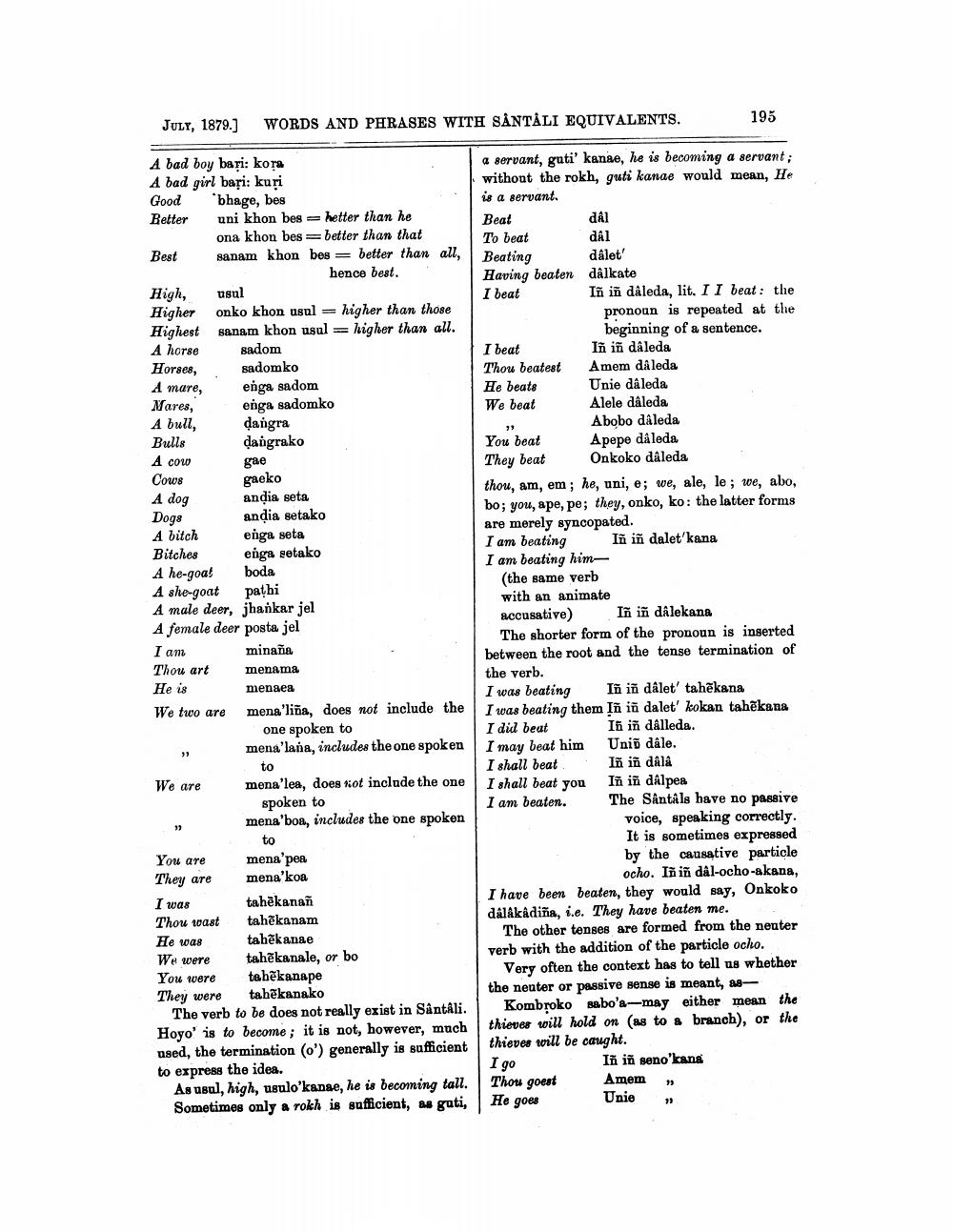________________
195
July, 1879.)
WORDS AND PHRASES WITH SÅNTÅLI EQUIVALENTS.
dal
Horses, A mare,
A bad boy bari: kora A bad girl bari: kuri Good bhage, bes Better uni khon beshetter than he
ona khon bes=better than that Best sanam khon bes = better than all,
hence best. High, usul Higher onko khon usul = higher than those Highest sanam khon usul = higher than all. A horse sadom
sadomko
enga sadom Nares, enga sadomko A bull, dangra Bulls daigrako A cow Cows
gaeko andia seta
andia setako A bitch enga seta Bitches enga setako A he-goa! boda A she-goat pathi A male deer, jhankar jel A female deer posta jel I am
minaña Thou art menama He is
menaea We two are mena'liña, does not include the
one spoken to »
mena'lana, includes the one spoken
gae
A dog Dogs
a servant, guti' kanae, he is becoming a servant; without the rokh, guti kanae would mean, He is a servant. Beat
dal To beat Beating
dálet' Having beaten dålkate I beat
Iñ iñ daleda, lit. I I beat: the
pronoun is repeated at the
beginning of a sentence. I beat
Iñ iñ dâleda Thou beatest Amem dåleda He beats
Unie daleda We beat Alele dâleda
Abobo dâleda You beat A pepe då leda They beat Onkoko daleda thou, am, em; he, uni, e; we, ale, le; we, abo, bo; you, ape, pe; they, onko, ko: the latter forms are merely syncopated. I am beating Iñiñ dalet'kana I am beating him
(the same verb with an animate accusative) Iñ iñ dalekana
The shorter form of the pronoun is inserted between the root and the tense termination of the verb. I was beating Iñ iñ dálet' tahēkana I was beating them Iñiñ dalet' kokan tahēkana I did beat
Iñ in dAlleda. I may beat him Uniñ dâle. I shall beat Iñ iñ dala I shall beat you In in dAlpes I am beaten. The Sântals have no passive
voice, speaking correctly. It is sometimes expressed by the causative particle
ocho. Iñiñ dâl-ocho-akana, I have been beaten, they would say, Onkoko dalAkadiña, i.e. They have beaten me.
The other tenses are formed from the neuter verb with the addition of the particle ocho.
Very often the context has to tell us whether the neuter or passive sense is meant, as
Kombroko sabo's-may either mean the thieves will hold on (as to a branch), or the thieves will be caught. I go
Iñ iñ seno'kana Thou goest
Amem He goes
Unie 12
to
We are mena'lea, does not include the one
spoken to mena boa, includes the one spoken
to You are mena'pea They are
mena'koa I was tahēkanañ Thou wast tahēkanam He was tahēkanae We were
tahēkanale, or bo You were tabēkanape They were tahēkanako
The verb to be does not really exist in Santali. Hoyo' is to become; it is not, however, much used, the termination (o') generally is sufficient to express the idea.
As usul, high, usulo'kanae, he is becoming tall. Sometimes only a rokh is sufficient, as gati,




